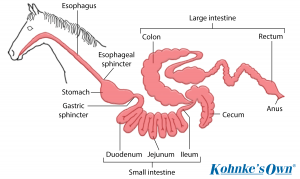The equine digestive system is a unique and complex system. It is designed to process small amounts of food frequently and convert them into nutrients that can be used for growth, maintenance and energy. The special structure of the digestive system allows the horse to adapt to a wide variety of feeds from different grass and hay varieties to a range of raw grains and processed feeds. The digestive system can be divided into two main parts, the foregut and hindgut, which carry out specific processes. It is important to understand the function of the equine digestive system to provide a basis for formulating suitable diets, management practices and to avoid digestive upset for your horse.

Structure of the Digestive System
The Foregut Digestive System
The foregut includes the stomach, where a small amount of soluble fibres and protein are broken down by gastric acid. The stomach is a ‘J’ shaped expandable bag, with a relatively small capacity, ranging from 5 -7 litres in a standard sized horse. Highly fibrous feeds, such as hay and chaff, are passed more quickly through the stomach as compared to denser grains and protein meals. The lower stomach compartment is lined with a glandular lining which secretes gastric acid from 25 – 30 litres daily, with or without food entering the stomach.
The small intestine is between 21- 25 metres in length, with a volume of 40 – 50 litres. The small intestine is important as it digests up to 70 % of starch and Non-Structural Carbohydrates (NSC’s) as well as being the primary digestive system of small chain sugars, protein, fats and some minerals. About 80 % of calcium, as the primary mineral is absorbed from the small intestine and other minerals, such as magnesium, sodium, potassium and chloride are also well absorbed from the small intestine.
The Hindgut Digestive System
The hindgut or large intestine includes the cecum and colon which both facilitate critical fibre digestion and contains billions of microbes essential for the fermentation of roughage from grass, grain and hay. Fermentation is the process of chemical breakdown of substances by bacteria, yeast and other microorganisms, referred to as microbiota, which colonise in the hindgut. The result of the fermentation process is the provision of energy, vitamins, minerals and amino acids vital for overall horse health and well-being. Poor fermentation and a compromised hindgut digestive system can result in inadequate feed utilisation, runny manure, poor appetite as well as a noticeable poor overall condition. Water is also stored in the fermentation mass of fibre and absorbed from the hindgut.
Reducing Digestive Disturbances
Due to the complex nature of their digestive system, horses are often subject to digestive disturbances. Common digestive problems in horses include colic, stomach acid irritation and ulcers, feed or grass sensitivity, inability to maintain weight and condition, scouring or intermittent loose manure and hindgut acidosis.
Support for digestive health begins with the formulation of a diet which provides an adequate amount of good quality roughage as well as other grains or concentrate feeds which are specific to each individual horse’s requirements. As modern horse management methods can lead to an increase in stabling or hours spent locked away from pasture, as well as early training prior to feed time, extended travelling hours and competition, these practices may interfere with a horse’s physical digestive processes. It is important that horse care and management accounts for the horse’s digestive needs.
Supplements to Support Digestive Health
A good quality supplement to aid digestive health and function is beneficial for any horse. The popular Kohnke’s Own® supplements Gastro-Coat® and FABBY® are widely used to help horses overcome many common digestive challenges.
Kohnke’s Own Gastro-Coat is a natural multi-action supplement to help support gastric health and function of the foregut digestive system. Gastro-Coat is particularly beneficial to horses with gastric irritation issues, ‘picky’ eating problems and stomach sensitivity.
Kohnke’s Own FABBY is a premium probiotic and prebiotic supplement which can be provided to all horses for optimum health of the entire gastro-intestinal system, particularly digestive efficiency and the function of the hindgut digestive system. FABBY is especially beneficial to horses with poor hindgut function, performance horses on high grain diets, aged horses or hard keepers.
Gastro-Coat and FABBY are highly compatible because they are focused on the overall efficient function of the digestive tract and the different problems that can arise with these important sections of the gut. They are the perfect combination to be fed each day to highly sensitive or digestively challenged horses.
You can read more about the great results owners and trainers have had using Gastro-Coat and FABBY for the health of their horse’s digestive system on our Facebook page.
